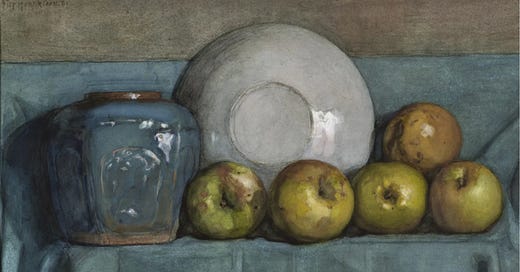How you perceive the world shapes your writing voice
A couple insights, a brief detour and an exercise
I was making the following list when I had a revelation.
Things that I know about my writing voice: fascination with small details, how emotions are expressed in your body, how certain people feel in your body, led by dialogue, not afraid of deep emotions, few place/nature descriptions, less about the seen world and more about the felt world, sensory experiences (how things taste, feel, etc.)
The revelation being, those words also describe how I experience the world.
Over the years, as I explored my writing voice, I naturally looked to other writers to study their use of language and metaphor, to evaluate the application of specific techniques, to validate my own notions of what I liked and didn’t like to read about.
What I learned helped me to hone my voice, but the source of my writing voice is not outside myself. It was only by listening more closely to my own body, in removing obstacles that prevented me from understanding my true nature and by holding space for my own experiences that the writing truly began to flow.
The way I experience the world is the way that I write the world. Knowing that, how can better understanding and acceptance of my self make me an even better writer?
(This is where we take a small detour so I can better make my point, bear with me)
This all started when I rediscovered a writing exercise in an old(ish) notebook:
The first thing most people notice about me is my eyes. Literally, because I have a small face with big eyes that are magnified to cartoon-like proportions by glasses. But also figuratively, because I have a talent for seeing people as they are.
My eyes take snapshots and log information with meticulous efficiency. Most people aren’t aware of everything I notice, because I don’t draw attention to what I have seen. I rarely pull away in shame or disgust. Whatever you are putting out into the world with your body, your words, I see it, record it, accept it and move forward.
This is a super power, but it’s also a trap.
A super power, because I see who you are right now and who you could be.
But also trap, because I see who you are right now and who you could be.
I say a ‘trap’, because by default, I engage with a person’s best self and I sometimes give too much to people who are not operating from that best self. Throughout my life, I have attracted so many people in crisis, people seeking the relief of being seen, of being accepted. I feel better when I’m around you, they always say. But I wouldn’t feel better around them.
A trap also, because in some cases, unconditional acceptance is the worst thing you can give a person who relies on smoke and mirrors to move through the world. I cannot tell you how many friends I have lost because I didn’t treat them with the pity, fear or disgust they thought they deserved.
The irony in all this is that I actually have terrible eyesight. My prescription has caused the brow of more than one optometrist to furrow.
Once these glasses come off, I am reduced to a world of shapes, sounds and smells. As a result, over the years, my other senses have sharpened to help me navigate the world. If I know you, I can readily recognize you by your shape, your gait, your voice and your smell. Even at a distance. Some people are so deeply embedded in my awareness that I can sense them coming before my eyes register their presence. The fizz of life drops into perfect silence right before the person in question appears and when we are together, I will be unable to remember how long we spent talking, I will only remember how it felt.
My whole experience of being in this body, in this place, in this time, revolves around what I can and cannot see. The patterns that I track in order to react appropriately, to protect myself, to know when to open up, are perceived through my senses, my intuition, and not my intellect.
With these words fresh in my mind, I reviewed some pages from the novel. And I saw myself reflected back at me. No matter how much my characters talk and try to rationalize what’s happening, it always comes back to how the moment makes them feel, how their senses grapple with new information to make sense of it all. They face the same dilemmas that I do, they track the same patterns, they feel as deeply as I do.
</detour>
So now you try. Write out your experience of the world. How do you collect information and identify patterns? What senses do you rely on the most?
And what does it tell you about who you are as a writer?
If you come to any new conclusions about the connection between your lived experience and your writing style, let me know.





